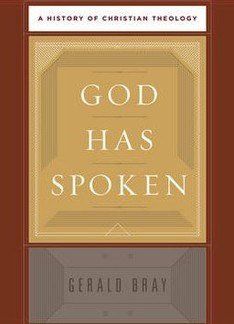About 30 years ago I was at a meeting of the Tyndale Fellowship Historical Theology Study Group when someone raised the question, ‘What difference does being an evangelical make to the study of the history of theology?’
Gerald Bray, the author of this book, offered an answer: ‘It’s what you consider to be important’. Now, in this new book, Dr Bray ably demonstrates what that means in practice. The book is eminently readable, a handy reference text, and a work which at regular intervals prompted me to shout, ‘Hallelujah!’
The book has a trinitarian structure. First, after a short analysis of the Jewish roots of the Christian faith, the history of thinking about the person and work of the three members of the Trinity are surveyed in turn.
This precedes a final section drawing the threads together by outlining the developments which led to the early trinitarian conclusions. Then recent debates about the Trinity and the doctrine of God are considered.
This structure is not artificially imposed. It represents the order in which these themes were tackled during the unfolding story of Christian theologising. The book is rooted in a sound doctrine of Scripture and stands firmly in the Reformed tradition.
A brief review of such a large book can only highlight some outstanding features. I shall mention five.
1. Bray makes the theological deliberations of the early church gripping, and adeptly signals the relevance of apparently abstruse topics.
2. He identifies the major pioneers in the progress towards the understanding of essential truths such as the Trinity, incarnation, atonement and Holy Spirit. This is a useful guide to enable those who wish to focus on specific issues to avoid pursuing dead-ends.
3. Bray’s treatment of modernistic liberalism is brief in comparison with his discussion of patristic and Reformation theology. This itself makes the point that liberal theology is fundamentally an aberration. When he deals with the biblical criticism stemming from the Enlightenment, he does a brilliant job tracing the links with modern philosophical movements and the connections between various theological developments. For me, this shed an enormous amount of light on the whole subject and underlined the vital aspects of sound, Bible-based theology.
4. Bray rightly questions the current predilection with theologies for particular categories of people. He insists that theology is about God not about us, and that focusing on the Trinity turns us away from ourselves to him. Theology is a global conversation, not a preoccupation for particular in-groups.
5. Finally, as one whose ministry is in theological training, I appreciated Bray’s rejection of ‘the cerebral academic exercises that so often pass as “theology” in our universities, divinity schools and theological colleges’. By contrast, he rightly pleads for ‘a humble and contrite heart, which alone will see the glory of God’ (p.812).
Jonathan Bayes
Thirsk





